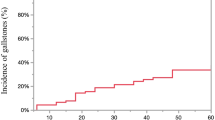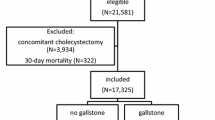Abstract
The risk of gallstones developing after gastrectomy in middle-aged Japanese men was investigated in a study of 2,738 men aged between 48 and 56 years who underwent both gallbladder ultrasonography (US) and a barium study of the upper digestive tract. It was revealed that 61 men had gallstones, 37 had had their gallbladder removed previously, and 55 had a history of gastrectomy. The prevalence of gallstones was 3.5 times higher in the men who had previously undergone gastrectomy (7.7%) than in those who had not (2.2%) (P=0.03). Moreover, gallstones tended to be more prevalent in those who had undergone Billroth II gastrectomy (12.5%) compared with those who had undergone Billroth I gastrectomy (5.6%); however, the difference was not significant. These results indicate that gastrectomy using either Billroth I or Billroth II reconstruction predisposes to gallstone formation. Nevertheless, it was estimated that prior gastrectomy was responsible for no more than 5% of gallstones in the study population.
Similar content being viewed by others
References
Krause U (1963) Long term results of medical and surgical treatment for peptic ulcer. Acta Chir Scand 310 [Suppl]:82–86
Lundman T, Orinius E, Thorsen G (1964) Incidence of gallstone disease following partial gastric resection. Acta Chir Scand 127:130–133
Lorusso D, Misciagna G, Noviello RM, Tarantino S (1988) Cholelithiasis after Billroth II gastric resection. Surgery 103:579–583
Rehnberg O, Haglund U (1985) Gallstone disease following anterectomy and gastroduodenostomy with or without vagotomy. Ann Surg 201:315–318
Sugiyama Y, Ozawa M, Torii Y (1983) Cholelithiasis following gastric cancer surgery (in Japanese). Nippon Shokaki Geka Gakkai Zasshi (J Jpn Gastroenterol Surg) 16:879–884
Kono S, Ikeda N, Yanai F, Shinchi K, Imanishi K (1990) Alcoholic beverages and adenomatous polyps of the sigmoid colon: A study of male self-defense officials in Japan. Int J Epidemiol 19:848–852
Csendes A, Larach J, Godoy M (1978) Incidence of gallstones development after selective hepatic vagotomy. Acta Chir Scand 144:289–291
Clave RA, Gaspar MR (1969) Incidence of gallbladder disease after vagotomy. Am J Surg 118:169–174
Ihasz M, Griffth AC (1981) Gallstones after vagotomy. Am J Surg 141:48–50
Mujahed Z, Evans JA (1971) The relationship of cholelithiasis to vagotomy. Surg Gynecol Obstet 133:656–658
Fletcher MD, Clark GC (1968) Gall-stones and gastric surgery. A review. Br J Surg 55:895–899
Messing B, Bories C, Kunstlinger F, Bernier JJ (1983) Does total parenteral nutrition induce gallbladder sludge formation and lithiasis? Gastroenterology 84:1012–1019
Author information
Authors and Affiliations
Rights and permissions
About this article
Cite this article
Ikeda, Y., Shinchi, K., Kono, S. et al. Risk of gallstones following gastrectomy in Japanese men. Surg Today 25, 515–518 (1995). https://doi.org/10.1007/BF00311307
Received:
Accepted:
Issue Date:
DOI: https://doi.org/10.1007/BF00311307




